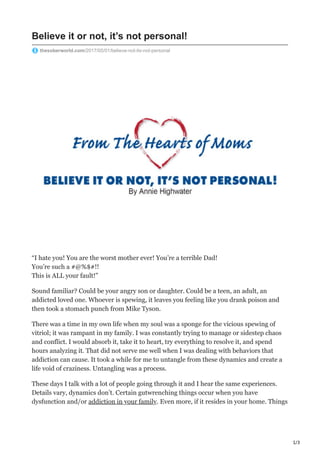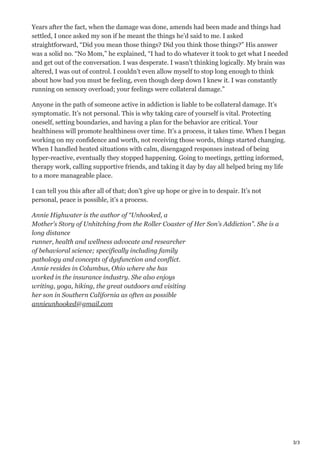Believe it or not its not personal
- 1. 1/3 Believe it or not, it’s not personal! thesoberworld.com/2017/05/01/believe-not-its-not-personal “I hate you! You are the worst mother ever! You’re a terrible Dad! You’re such a #@%$#!! This is ALL your fault!” Sound familiar? Could be your angry son or daughter. Could be a teen, an adult, an addicted loved one. Whoever is spewing, it leaves you feeling like you drank poison and then took a stomach punch from Mike Tyson. There was a time in my own life when my soul was a sponge for the vicious spewing of vitriol; it was rampant in my family. I was constantly trying to manage or sidestep chaos and conflict. I would absorb it, take it to heart, try everything to resolve it, and spend hours analyzing it. That did not serve me well when I was dealing with behaviors that addiction can cause. It took a while for me to untangle from these dynamics and create a life void of craziness. Untangling was a process. These days I talk with a lot of people going through it and I hear the same experiences. Details vary, dynamics don’t. Certain gutwrenching things occur when you have dysfunction and/or addiction in your family. Even more, if it resides in your home. Things
- 2. 2/3 go missing, there are pressures for money, arguments over car keys and rides, so on and so forth. The presence of addiction completely changes the trajectory of a family and can turn a once peaceful atmosphere upside down. A recent email I received: Hi Annie, So my daughter called this morning. She wanted to use my credit card for work clothes and said she would repay me in a few months. I didn’t want to do it this time. I know the routine- she will return the clothes and once again I won’t ever see a dime of my money. I said no. She then went on a 10-minute tirade, ranting about what a terrible, selfish person I am and how much she hates me. She said I was never a good mother, I am a worthless person, and that everyone hates me. All because I said no! I’m afraid of how hateful she will be the next time I see her. I don’t even know her anymore. How did you manage??” In times past, I questioned myself and my sanity when there were flare-ups of this sort. I would rack my brain and try to understand what I did wrong, why I was so worthless. What I could do to fix it. Or I would make the mistake of being lured to defend myself, never getting to the bottom of it. Finally, I realized, these conflicts don’t rise up with fairness and logic, they aren’t going to suddenly become fair and logical, even if I argue back until I’m out of oxygen, or I submit in order to have relief. I will confess, I got fed up and gave it right back sometimes, returning vicious for vicious. This was not dignified for anyone. The backlash against boundaries can be horrendous, especially when first setting them. What a horror when your own child (or any loved one) quickly becomes hateful. I remember the shock of it. We are some years past that, I’m more than grateful to say I’ve gone almost 5 years without conflict, dysfunction, or active addiction present in my daily life. I say that to say this: if you feel caught in an unending cycle of conflict, peace is possible. Boundaries do eventually work. At one time my life felt out of control with turmoil and conflict. As much as I know how that feels, I know peace is possible. I often hear from people who, like this frustrated Mother, are in the midst of this type of struggle, people who feel helpless and exhausted. I don’t offer advice outside of direction toward support; support is crucial! Find support online, or in a meeting, the sooner the better. I also always recommend seeking information and education. I tell folks what a therapist trained in family dysfunction told me: “Annie, you have to do whatever it takes for you to be okay, for you to be safe and at peace. For your environment to be as healthy as possible. Work on how you respond and what you allow.” And I tell people this – it’s not personal. This behavior is par for the course, it occurs with the disease of addiction, it’s not okay, it’s terribly painful and at times traumatizing. But it’s not personal. Realizing it’s not personal is a hard place to come to and it’s definitely a process, it takes time. It feels personal. Your personal belongings may become damaged or go missing. Your personal space is violated. Your personal character can oftentimes be assassinated. But the reality is, the adversarial behavior is not personal.
- 3. 3/3 Years after the fact, when the damage was done, amends had been made and things had settled, I once asked my son if he meant the things he’d said to me. I asked straightforward, “Did you mean those things? Did you think those things?” His answer was a solid no. “No Mom,” he explained, “I had to do whatever it took to get what I needed and get out of the conversation. I was desperate. I wasn’t thinking logically. My brain was altered, I was out of control. I couldn’t even allow myself to stop long enough to think about how bad you must be feeling, even though deep down I knew it. I was constantly running on sensory overload; your feelings were collateral damage.” Anyone in the path of someone active in addiction is liable to be collateral damage. It’s symptomatic. It’s not personal. This is why taking care of yourself is vital. Protecting oneself, setting boundaries, and having a plan for the behavior are critical. Your healthiness will promote healthiness over time. It’s a process, it takes time. When I began working on my confidence and worth, not receiving those words, things started changing. When I handled heated situations with calm, disengaged responses instead of being hyper-reactive, eventually they stopped happening. Going to meetings, getting informed, therapy work, calling supportive friends, and taking it day by day all helped bring my life to a more manageable place. I can tell you this after all of that; don’t give up hope or give in to despair. It’s not personal, peace is possible, it’s a process. Annie Highwater is the author of “Unhooked, a Mother’s Story of Unhitching from the Roller Coaster of Her Son’s Addiction”. She is a long distance runner, health and wellness advocate and researcher of behavioral science; specifically including family pathology and concepts of dysfunction and conflict. Annie resides in Columbus, Ohio where she has worked in the insurance industry. She also enjoys writing, yoga, hiking, the great outdoors and visiting her son in Southern California as often as possible annieunhooked@gmail.com


